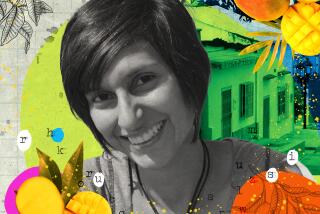OUT AND ABOUT : Soto Voce
- Share via
Pale, slight, black hair tinged with gray, wearing a sober gray suit, the poet Gary Soto looks like the UC Berkeley professor he is. But his voice has a light, eager, youthful lilt, and we can almost see a younger, dreamier Gary Soto peeking out from behind the 43-year-old’s thick glasses as he reads a new poem, “Waterwheel,” to a lively audience at the Pacific Design Center.
Here he’s 5 years old and waiting in the rain for a kid called Arnold who’s promised him a little plastic clamshell containing a miniature Chinese garden. Arnold never shows. But the boy keeps waiting, hoping and longing for this beauty to be his.
As we murmur appreciatively, Soto throws us a mischievous glance--clearly the dreamy kid is also a prankster. “And I’ve been waiting all my life for this thing to show up,” he says. We respond with a burst of laughter, as if to say, “We too!” delighting in the larger truth to be drawn Soto-style from the vibrant detail of the everyday.
Soto has come to read and then converse with novelist and essayist Alejandro Morales in the Lannan Foundation’s readings & conversations series. Born and bred in Fresno, Soto is an award-winning poet who’s also written essays, memoirs, novels, plays and children’s books. But he’s best known for poetry collections, such as “The Elements of San Joaquin” and “Who Will Know Us?” which are unsentimental depictions of the Chicano experience, especially childhood in the San Joaquin Valley.
Certainly the connection between audience and poet is palpable tonight. “Ohhh,” we murmur, poetry lovers of every age and ethnicity with a sizable contingent of students, as Soto reads “A Red Palm,” about a young farm worker as yet unbroken by hard labor, but suffering intimations of disappointment:
You were a fool in school, now look at you.
You’re a giant among cotton plants.
Light self-mockery such as this stirs huge laughs. More sober poems such as “The Gold Cannon,” which describes the young Soto’s fear and puzzlement over his father’s death, bring on a shuffle-free silence. But it’s Soto’s commentary and his bantering exchange with Morales, Soto’s former professor at UC Irvine, that provoke the biggest reactions.
Yeah, he says to waves of laughter, he left high school with a 1.6 grade average--”Perhaps one must be a D student to be a writer”--and went to Fresno City College. “Why go out of town for college, you know?” Before he woke up to poetry--first the Beats, later Pablo Neruda--he studied geography because he figured he’d just look at maps, take multiple-choice tests and not have to write anything. Summers, he swung a hoe, chopped beets and cotton--”We described it as Mexican golf.”
By evening’s end we are grinning at each other like idiots, high on Soto’s potent, comic-poetic brew. I think of the small English town of my own childhood, which also had its share of dark-skinned people, Pakistanis and West Indians, British colonial immigrants. But to the white majority--even to me, a budding lesbian with my own nascent sense of otherness--they were invisible. How inadvertently appropriate that I liked T. S. Eliot, an American who wanted to be English, who wrote in anguish of hearing the mermaids sing, “Till human voices wake us, and we drown.” Years later, Soto’s wryly humorous voice wakes us and we live--in his celebration of human experience and all its remarkable particularity and difference.
More to Read
Sign up for our Book Club newsletter
Get the latest news, events and more from the Los Angeles Times Book Club, and help us get L.A. reading and talking.
You may occasionally receive promotional content from the Los Angeles Times.







